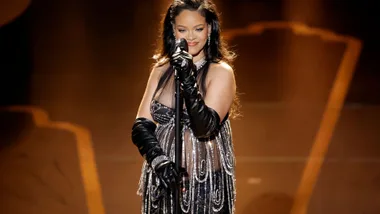What happens when women earn more than their male partners? Nothing good, according to the data.
Traditional gender roles, patriarchy, and the all-encompassing gender pay gap tend to mean that men out-earn their female partners. However when the reverse is true, studies show both men and women experience a dip in the satisfaction of their relationships. In disturbing news, a pay rise where a woman out-earns her partner increases her chance of experiencing domestic violence by 35 percent.
It’s a dynamic explored in Fair Play, Netflix’s buzzy new film about a couple working in the cutthroat world of New York finance.

Emily (Phoebe Dynevor) and Luke (Alden Ehrenreich) have to keep their relationship secret from the ruthless hedge fund they work at, but otherwise seem to have it all: promising careers, a fancy NYC apartment, and a wedding to plan.
But the very foundation of this relationship comes under threat when Emily receives a promotion over Luke, revealing an insidious gender dynamic in the process.
Though Luke initially attempts to feign happiness for his partner, this act eventually crumbles, in turn poisoning their relationship from the inside out. Before long, Luke’s jealousy erodes his masculinity, manifesting as neurosis, a decreased libido and eventually, aggression.
Emily, on the other hand, attempts to diminish her successes to placate Luke, an exercise that eventually sees her deeply unhappy and resentful.

While the specifics of Luke and Emily’s situation might not be all that common in real life, the sinister beliefs about traditional gender roles that underpin their relationship breakdown are deeply entrenched.
The film’s director, Chloe Domont, said the inspiration from the story was taken directly from her own experiences. “When my career started to take off, I had this feeling that my success would cost me my relationships,” she told The Guardian.
“I was dating men who, on the one hand, supported me and were attracted to me because I was ambitious and intelligent and they wanted me to succeed. But on the other hand, there was this feeling that they needed to get there first, and for whatever reason my accomplishments became a poor reflection of their self-worth.”

Sharing a similar perspective, Holly*, 36, said while her partner is supportive of her financial success, she isn’t entirely at peace with earning more money than him.
“It definitely plays on my mind,” she told marie claire Australia.
“He’s endlessly supportive of my career, but I worry about whether he feels badly about his own career in comparison. I know I’d feel more comfortable if he was bringing in equal money to me — not just because we’d have more money as a household (although there’s that, too), but because it would be one less thing I worry about.”
Perhaps then, Fair Play just accentuates an uncomfortable truth that has been there all along: ambitious women like Emily aren’t entirely comfortable with ‘having it all’, and their male partners aren’t always all that happy for them.
So how can heterosexual couples navigate this tricky terrain?
According to Lysn psychologist Nancy Sokarno, it can be a delicate balance.
“Healthy relationships should allow both partners to grow and succeed without fear of upsetting each other,” Sokarno tells marie claire Australia.

For women struggling to embrace their success, she suggests starting “by having an open and honest conversation with your partner”, sharing goals, ambitions, and the progress you’re making towards your success.
“Make sure your partner understands how important these achievements are to you and that you acknowledge theirs too. Show them that you are just as committed to their success as they are to yours. By being a source of empowerment for your partner, they are more likely to reciprocate those same traits,” she adds.
However, she also warns of the red flags to watch out for: withdrawal, jealousy, competitive behaviour, diminishing your achievements, and undermining your goals.
“We certainly saw this behaviour in Fair Play – where the partner becomes distant or unresponsive when you achieve something significant, showing that they are likely struggling with their feelings of insecurity,” she said.
Women might still be earning just 87 cents for a man’s every dollar, according to the 2023 gender pay gap data, but apologising for your success along the way? That’s just adding salt to the wound.
If you or anyone you know is impacted by sexual assault or family violence, call 1800RESPECT on 1800 737 732 or visit 1800RESPECT.org.au










